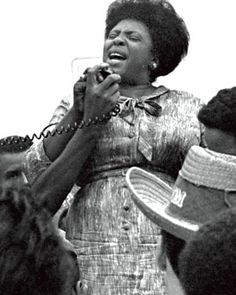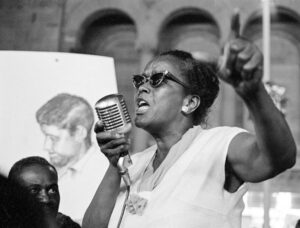Fannie Lou Hamer
 Like many African Americans living in the Jim Crow South, Fannie Lou Hamer was not aware she had voting rights. “I had never heard until 1962, that Black people could register and vote,” she once explained. The granddaughter of enslaved Black people, Hamer was born in Montgomery County, Mississippi, in 1917. As the youngest of 20 children in a family of sharecroppers, she was forced to leave school during the 6th grade to help on the plantation. Hamer became a nationally recognized civil rights activist, boldly advocating for the right to political participation that Black Americans had long been denied.
Like many African Americans living in the Jim Crow South, Fannie Lou Hamer was not aware she had voting rights. “I had never heard until 1962, that Black people could register and vote,” she once explained. The granddaughter of enslaved Black people, Hamer was born in Montgomery County, Mississippi, in 1917. As the youngest of 20 children in a family of sharecroppers, she was forced to leave school during the 6th grade to help on the plantation. Hamer became a nationally recognized civil rights activist, boldly advocating for the right to political participation that Black Americans had long been denied.
In 1962, Hamer attended a meeting arranged by the Student Nonviolent Coordinating Committee (SNCC), an interracial civil rights group that played a central role in organizing and encouraging Black residents in the South to register and vote. Resulting from her activism she was forced to temporarily leave her family for their safety. Several days after she left, white supremacists sprayed 16 bullets into the home where Hamer was staying. On another occasion, she was violently kicked and arrested for trying to integrate a restaurant. She was arrested and endured four days of being beaten by the officers which left her physically disabled and with permanent scars. Her kidney was injured from the blows.
In the later years of her life. Hamer remained at the forefront of the fight for black political rights. As a founding member of the National Women’s Political Caucus, which still promotes women politicians today. Hamer died in 1977, all of her efforts were grounded in the recognition that the act of casting a ballot was a fundamental right of every American citizen.
Ella Baker
 There are many unsung heroes of the Civil Rights Movement and during Black History Month, the members of the God’s Diversity Committee wish to share the stories of some of these remarkable advocates who often worked quietly behind the scenes. One such person was Ella Baker.
There are many unsung heroes of the Civil Rights Movement and during Black History Month, the members of the God’s Diversity Committee wish to share the stories of some of these remarkable advocates who often worked quietly behind the scenes. One such person was Ella Baker.
Growing up, Ella Baker (1903-1986) was greatly influenced by her grandmother’s stories of her early life as a slave and how her quiet resistance, and at times open defiance, helped her survive enslavement and preserve her dignity. As a result of these stories and her own observations of the oppression of African Americans in the South, Ella Baker grew into an independent and often provocative defender of human rights. During her early career, she devoted her efforts to ending Jim Crow laws and in registering Black Southerners to vote.
An organizational genius, Ms. Baker was involved with many established civil rights organizations such as the National Association for the Advancement of Colored People (NAACP) and the Southern Christian Leadership Conference (SCLC). Although committed to her work, she was often critical of the centralized leadership of these organizations and favored more grass roots activities. She was so inspired by the black college students who boldly sat at a formerly segregated Woolworth’s lunch counter in Greensboro, North Carolina, that she left the SCLC to assist the new student activists in their movement. She helped create the Student Nonviolent Coordinating Committee (SNCC) which, with her guidance and encouragement, provided powerful and effective advocacy for human rights through nonviolent direct action.
Prayers for Black History Month
February 11, 2024
Thank you, Lord for those who have brough light to the world with their kindness and courage. Help us never to forget the past and those who have worked to make the lives of others better. Give us the strength that many black people had as they stived to make a difference in the world. Help us to keep their memory alive and to use the stories from the past to help us make good choices in the present. Amen
Prayer written for a slide presentation on Black History
St. Michael’s College History Department, Colchester, Vermont
October 2007
February 4, 2024
Compassionate God, who sent Jesus Christ to deliver us from all manner of injustice and inequalities, create in us new hearts and enlarged visions, to see the image of God in every person irrespective of background, race and ethnicity.
May we be generous on our love of others as we work towards ending racism and injustice; creating communities of human flourishing, through Jesus Christ, your son our Lord, who is alive and reigns with you, in the unity of the Holy Spirit, one God, now and forever. Amen.
Church of England
Culture Resources:
Black Americans have contributed to and defined much of American performance, dance, and fashion culture in ways generally underappreciated. To learn more about some of their amazing and creative contributions, please consider the following resources:
“Black Broadway: A Proud History, a Limitless Future.” – a concert showcasing Black voices from a variety of significant Broadway productions.
https://www.pbs.org/show/black-broadway-proud-history-limitless-future/
“How Black Culture Has Shaped American Dance History” by Charise Roberts. January 23, 2024. https://www.steezy.co/posts/how-black-culture-has-shaped-american-dance-history. This article contains numerous video clips illustrating the many contributions of Black culture to dance, from the Charleston, Tap, the Lindy Hop, to the dancing of more current icons like Michael Jackson and Beyonce. The article concludes with a tribute to Misty Copeland, the first Black ballerina to become a principal dancer in the American Ballet Theatre.
“How Black Culture/Designs Influences Fashion Trends in Today’s Generation” by Anand Subramanian, March 17, 2023, https://www.funtimesmagazine.com/2023/03/17/429046/how-black-culture-designs-influences-fashion-trends-in-todays-generation.This online article discusses the impact of Black culture on fashion, especially on streetwear, sneaker and athletic culture, hip-hop and other music genres. See also “The Influence of Black Culture on Fashion Trends” by Samantha Warren, February 23, 2023 https://scrappyapparel.com/black-culture/
Suggested Resources:
Books:
“Four Hundred Souls: A Community History of Africa America 1619-2019”
by Ibram X. Kendi
“Our Time Is Now: Power, Purpose and the Fight for a Fair America”
by Stacy Abrams
“The Black Church: This is Our Story, This is Our Song”
by Henry Louis Gates, Jr.
“Becoming” by Michelle Obama
“Black History for Beginners” by Denise Dennis & Susan Willmarth
“The Talk: Conversations About Race, Love & Truth” by Wade & Virgina Hudson
T.V. Programs
Netflix-” Color in Black & White ‘ Colin Kaepernick, a NFL player, tells his story .
You-Tube “Virtual Museum of Natural Museum of African American History (53 mins.)
You-Tube “Daisy Bates: 1st Lady of the Rock” (Story of 9 Black students to attend Little Rock School)
PBS/Whyy2 (You-Tube) “Black Broadway”
HBO “The Color Purple” (2023)

